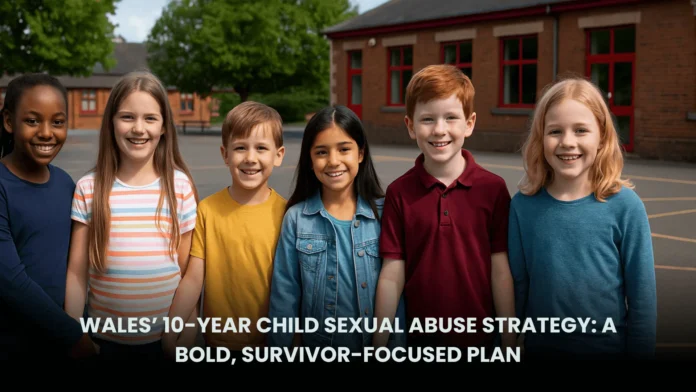10-Year Child Sexual Abuse Strategy: A Decade of Change Begins
In an unprecedented move that could set a new benchmark across the UK, the Welsh government has launched a public consultation on its first long-term strategy to tackle child sexual abuse. With estimates revealing that over 25,000 children and young people in Wales face sexual abuse each year—many cases hidden in silence—this bold, ten-year plan aims to bring systemic change.
But this is more than a government document. It is a call for collective healing and decisive action, built on real voices, real stories, and a relentless pursuit of safeguarding Wales’ youngest citizens.
Why a 10-Year Plan Is More Than Just a Policy
The sheer scale of child sexual abuse in Wales is both staggering and deeply concerning. According to recent studies, tens of thousands of children face abuse annually—yet only a fraction of these cases are reported or even identified by authorities. A large portion of this trauma is overlooked and untreated, particularly in online settings.
This is not just a child protection issue; it’s a public health emergency that demands attention, empathy, and strategic foresight.
A Survivor-Centric Strategy Rooted in Real Voices
At the heart of this new framework is one powerful principle: listen to those who’ve lived it. Children’s Minister Dawn Bowden stressed that the involvement of impacted communities and survivors will be crucial to the strategy’s success. “The voices of people affected by sexual abuse will shape this work from start to finish,” she affirmed.
The government has already begun consulting stakeholders but is urging individuals, survivors, families, and communities across Wales to participate in shaping the final strategy. The public consultation is open until September, with the full plan expected to guide national action through 2035.
What the Strategy Promises to Deliver
Key Proposals Include:
- Encouraging survivor storytelling: Adult survivors will be supported in sharing their stories, helping to dismantle stigma and inspire collective healing.
- Improved professional training: Those working with children, families, and adults—especially in healthcare, education, and social services—will receive specialized training on the long-term impacts of abuse.
- Visibility of support services: The plan aims to increase awareness and accessibility of help for adult survivors of child sexual abuse, especially in underrepresented areas like rural Wales.
- Establishing ‘lived experience’ groups: Young survivors will have regional platforms to share their perspectives, ensuring that youth voices are not only heard but integrated into every layer of response and prevention.
Standing Alone — And Ahead
While other UK nations have adopted short-term child protection action plans, Wales is the first to commit to a comprehensive 10-year vision. Ministers describe this as a clear signal of unwavering dedication to long-term change.
They also noted the evolving nature of abuse, particularly the increased prevalence of online exploitation, which demands modernized solutions that move with technology and trends—not behind them.
Collaborating with Experts for Authentic Impact
This strategy isn’t built in isolation. The Welsh government has partnered with national child protection organizations and survivors’ advocacy groups to ensure the strategy reflects both expert insight and lived realities.
Notable collaborators include:
- NSPCC (National Society for the Prevention of Cruelty to Children)
- Barnardo’s
- Centre of Expertise on Child Sexual Abuse
- Adult survivor groups across Wales
This collaboration ensures the plan is deeply informed, survivor-led, and evidence-backed—three pillars critical to its potential success.
Controversies and Calls for Accountability
While the Welsh government is forging ahead, calls for a Wales-wide public inquiry into historical and systemic child sexual abuse continue. Conservative leader Darren Millar has openly criticized the government for allegedly resisting such scrutiny, pointing to concerns over grooming gangs and institutional failures.
In response, ministers confirmed their active engagement with the England and Wales inquiry into the sexual exploitation of children, pledging full cooperation.
The Online Threat: A New Frontier for Abuse
The digital age has redefined the battleground. Online grooming, sextortion, and exploitation on social media platforms now form a large portion of abuse cases.
The strategy acknowledges these shifts and commits to:
- Developing tech-savvy prevention initiatives
- Educating children and parents about online safety
- Working together with law enforcement and IT businesses to identify and disrupt online predator networks
What This Means for Families and Communities in Wales
This is more than a policy—it’s a promise. A pledge to build a Wales where all children are protected, all survivors are helped, and support is given in place of silence.
For Families:
Parents will be better informed, supported, and empowered to recognize signs of abuse early. The strategy offers practical tools and resources to help them protect their children both offline and online.
For Survivors:
From therapeutic services to community forums, survivors will have greater visibility and access to healing resources than ever before.
For Professionals:
Teachers, doctors, social workers, and other frontline workers will receive ongoing training and resources, equipping them to identify, report, and support victims of abuse compassionately and effectively.
How You Can Get Involved
Whether you’re a survivor, a parent, a teacher, or a concerned citizen—your voice matters. The Welsh government’s consultation is open to all and invites people from every corner of society to contribute their thoughts.
Conclusion: A Future Where Every Child Is Protected
Wales has taken a monumental step by acknowledging the depth of this crisis and acting with vision. This ten-year strategy isn’t just about policy—it’s about building a future where survivors are heard, children are protected, and communities stand united against abuse.
In a world where silence has too often been the norm, this strategy offers hope—and a roadmap for real, lasting change.


